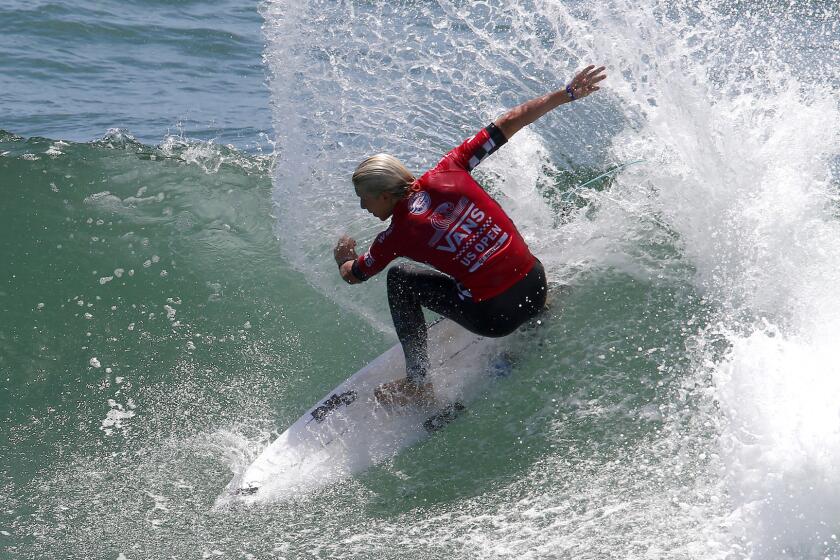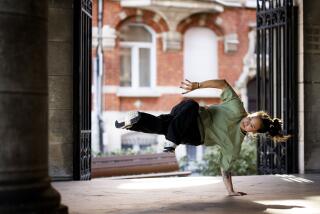Frothy to learn about surfing? Don’t be surf-stoked. The sport’s language really rips
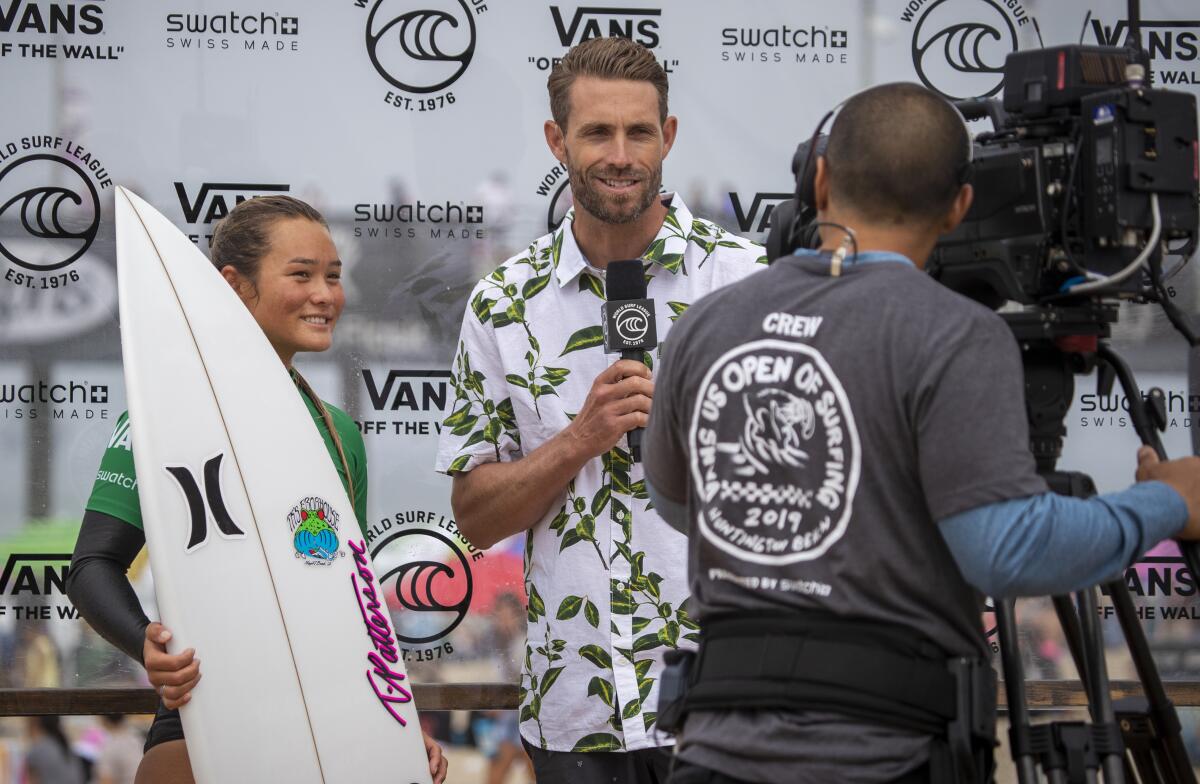
- Share via
The two surfers bumped fists on the sands of Huntington Beach and spoke in their sport’s native tongue.
“I’m stoked!” screeched Jett Schilling, a board tucked under his arm, his feet caked with sand and clumped in mud, his blond hair still damp and disheveled while droplets of water drizzled down his smiling cheeks.
The 15-year-old from San Clemente had returned from the waves as winner of his four-man U.S. Open of Surfing heat. Atop a seaside TV set, broadcaster Ian Foulke welcomed him.
“Off the top,” said Foulke, who was wearing charcoal trunks and a flowered button-up shirt while wielding a microphone and offering compliments in surfer code.
This alternative lexicon is thick with terms: grommet (noun. A young surfer), frothy (adj. Excited or eager, usually to go surfing), kooked (verb. To make a mistake), carved (verb. A sharp turn while riding a wave) and dozens more.
The vocabulary is baked into the foundation of the sport’s subversive subculture, the inter-connective tissue for a worldwide community.
“It’s like a rite of passage,” said fellow broadcaster Rosy Hodge, a South African former pro on the World Surf League tour.
Anyone can buy the gear, mingle in the surf and emerge from the water looking the part. New surfers get “surf-stoked” all the time, Hodge described. But the language, learned only over a lifetime on a board, is like a badge of honor, a certification of credibility.
“To be accepted by surfers is like being accepted by people of a different country,” added Shannon Hughes, another U.S. Open broadcaster originally from Huntington Beach. “If you speak their language, you’re accepted. Same with surfers. We can really easily pull out who’s authentic.”
Put another way: “I’m still a surf turkey, even though I’m 32 years old,” Hodge said. “But you can tell someone that is a new surf turkey.”
::
Fixated on the TV monitor in front of him, Ross Williams leaned forward and whimsically weaved together his words.
Surfer Bronte Macaulay had just caught a wave, and Williams was impressed. “She’s ripping, upside down. I love how she had a tight arc,” he said. “She didn’t go for a smooth, round carve. She really pivoted nicely.” He kept going, praising her “clean snap,” and that she “didn’t dig a rail” in the rolling waters.
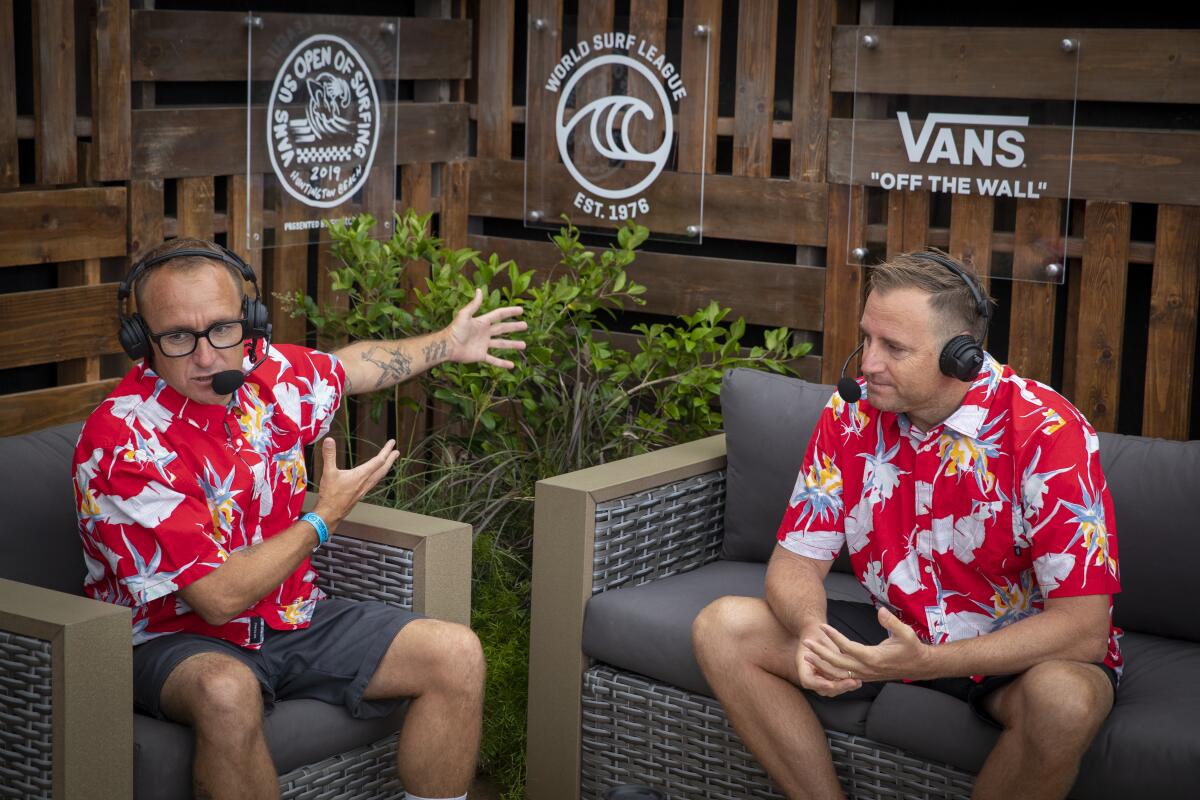
Chris Cote was seated next to him in the Huntington Beach broadcast booth — which, aside from the two cameras in the corner and three flat-screen monitors set on the floor, looked like a beach-side surf shack complete with outdoor couches, a wood-plank backdrop, and red Hawaiian shirts for each broadcaster. He translated into layman’s terms:
“You couldn’t have surfed that wave better,” Cote said, equally entranced but, to the untrained ear, more easily understood. “She did everything perfectly.”
Cote is an etymological expert in this field. He has been calling U.S. Opens for roughly 20 years and was the former editor in chief of the now-defunct TransWorld Surf Magazine. He helped compile the publication’s “Significant Surf Slang,” a comprehensive catalog of jargon and phrases that became a prominent feature in its pages. He has a love for surfing lingo.
“A lot of the terms sound really angry, ‘carving’ and ‘shredding,’ ” he said, gritting his teeth for emphasis. “And then you have these really light-sounding words like, ‘Foam bounce. Floater.’ And then, ‘Slash, slashing.’
“The contradictory terms are really fun to add together. You can make a Spicoli-ish sentence out of anything.”
That’s the stereotype surfers are often saddled with — the beach-blond, babbling, brainwashed caricature named Jeff Spicoli portrayed in the 1982 film “Fast Times at Ridgemont High.” It’s actually a skewed satirical sketch of their sophisticated world.
Their language may sound lazy; their attitude toward the sport is anything but.
“If anyone has tried to surf and they understand how difficult it is, and then they see what these guys and girls are doing on waves, it’s mind-boggling,” said U.S. Junior National surfing program coach Brett Simpson, who uses words like “chip” and “goiner” to describe different kinds of waves, but also is busy preparing for the sport’s Olympic debut in the 2020 Tokyo Games next summer.
“Hopefully we get a couple good days in the Olympics, and I think it will be a big hit.”
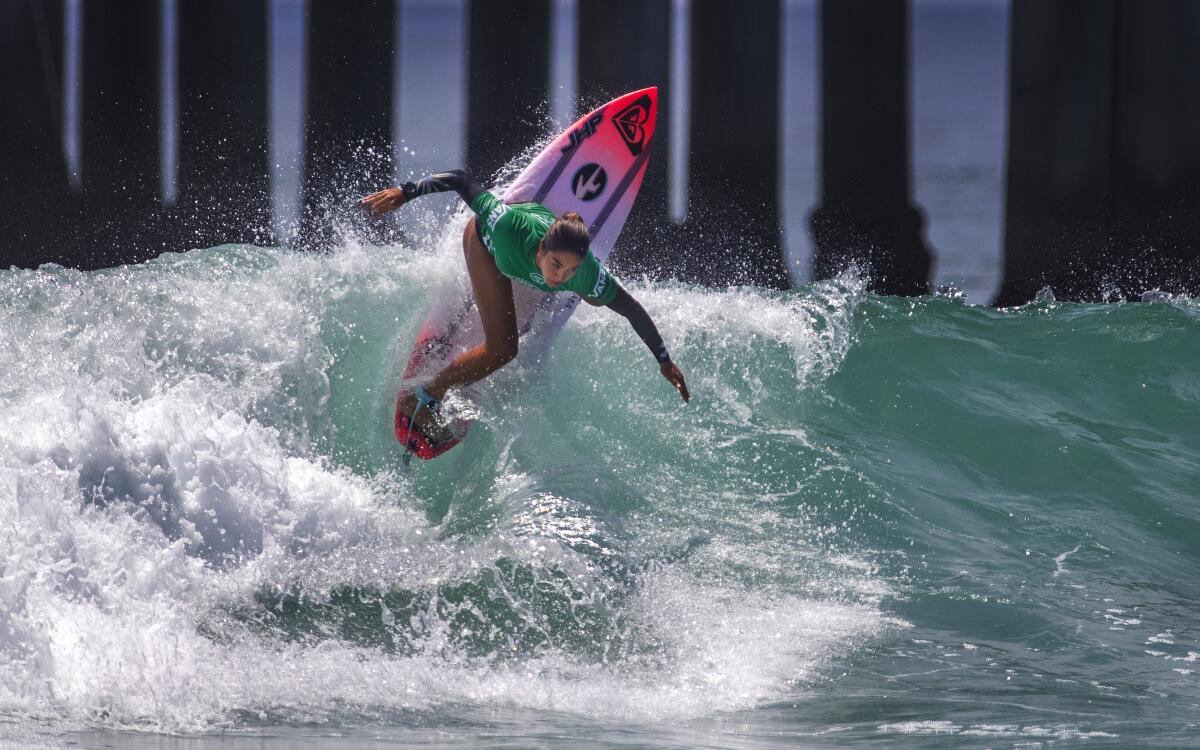
Surfing is in a transitional phase, its soulful energy mixing with newfound competitive spirit. There has been a world tour for decades, but only recently have most competitors hired personal coaches and board shapers and adopted workout and nutrition programs. Thanks to the Olympics, it’s on a collision course with casual sports fans, too.
“I’ve had to work hard to get surf lingo out of my conversation, to come across a little more general,” said Hughes, who recognized that the broadcasts — which are routinely watched by hundreds of thousands on Facebook and can be picked up by about 100 World Surf League broadcast partners worldwide — are the most accessible window to their world.
“I always try to put it through the lens of sitting next to a grandma on an airplane,” Cote added. “There’s so many terms that, if you said a sentence describing a wave, a layman would be like, ‘What are you talking about?’”
It’s a tight existential needle to thread. At present, the surf community is still relatively secluded in sandy enclaves that catch the waves just right. Commentators are still catering to crowds who largely know what they’re talking about.
There was just a single round of World Surf League Qualifying Series competition at the U.S.
“A majority of the fans who come out and watch this event, they know,” said Darren Brillhart, the U.S. Open surf director and beach public address commentator. “They know a lot about surfing and the history of this event. They come out every year.”
Some in the surfing community worry about the sport being co-opted, that it could cannibalize its subdued customs in search of popularity. Others see opportunity, an important step toward progress. The use of language is a leading example.
“I don’t think you need to use a lot of that terminology [on the air] to remain core within surf,” said Foulke, who also serves as a brand manager for Electric sunglasses in San Clemente.
“You don’t hear the NBA guys going, ‘Kobe, how was that sick dunk? That was so gnarly.’ They still talk about the technicalities of it, but they do it in a much more scientific, practical way.”
::
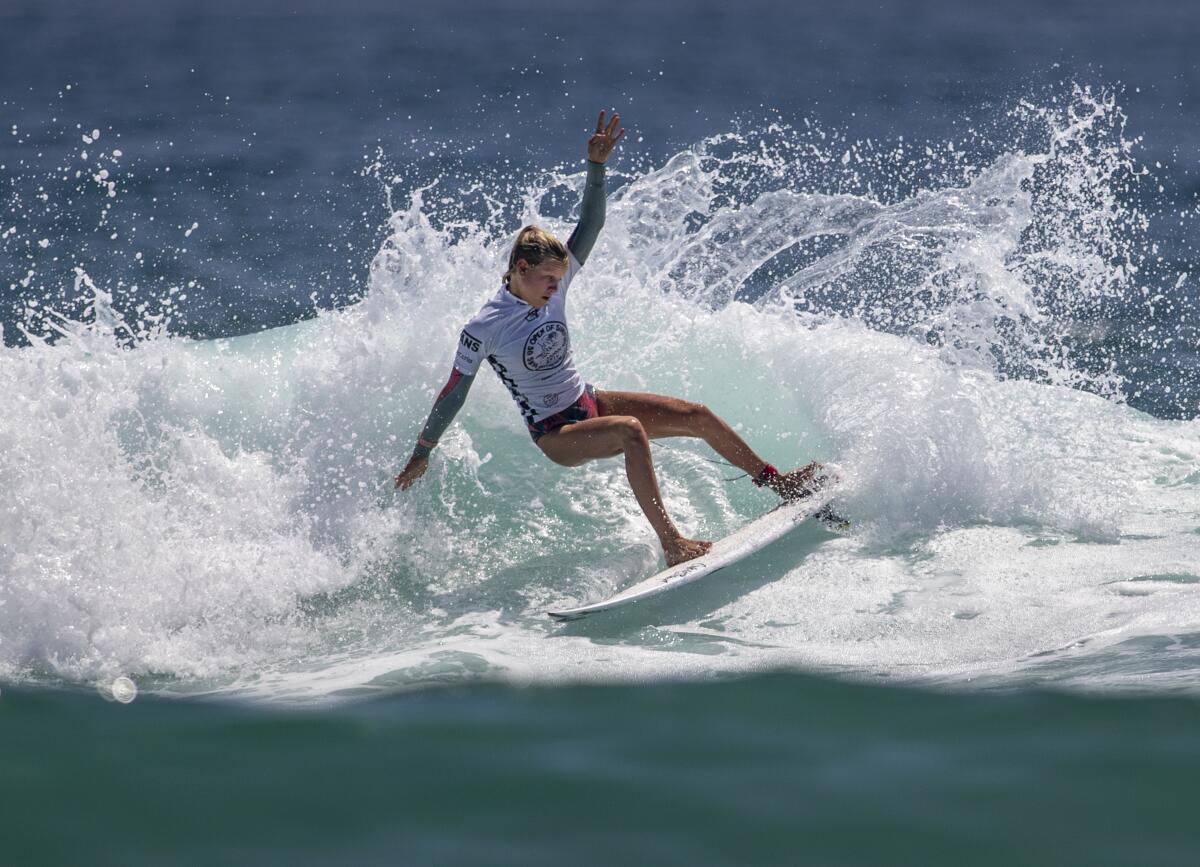
While the Pacific splashed against the shore behind him, Cote cracked a grin when asked how to describe a bad run on the wave. Once again, there were too many from which to choose.
“Wipeout is a classic,” he said. “Slam. Kook-slam. Fail. Kooked it.”
He was away from the mic, and free from the on-air restraints he places on himself. In this natural habitat, even the nuttiest of phrases were allowed.
“Every once in a while, you’re feeling the flow and you start to throw some more fun words out there,” he said. “You can go off the deep end with your bro-isms. Froth-mister. Froth-ability. Combining words is a big thing in surfing, and it makes it sound really kooky and fun.”
As he spoke, the public address announcer boomed more examples across the beach, letting loose while calling the action in the surf.
“Green splits it, green with a nice pop turn,” he said, identifying the surfers by the color of their suits. “Red slashes down, gets a nice lipper.”
Moments like these calm Cote’s concerns. As the sport embarks on a new era, he notes that snowboarding has reaped the benefits of a similar transition without ceding its core credibility.
Then he points to the north side of the Huntington Beach Pier, where the U.S. Open has been going since 1959. Even during the event, that end of the beach stays open to the public. On this morning, under the umbrella of a gray California haze, an army of wet suits dot the horizon — amateur surfers waiting for the waves to roll in, learning a language they’ll remember the rest of their lives.
“Those guys have been sitting there for 10 minutes,” Cote said. “So what are they doing? They’re talking to each other, and almost subconsciously picking up the slang.”
More to Read
Go beyond the scoreboard
Get the latest on L.A.'s teams in the daily Sports Report newsletter.
You may occasionally receive promotional content from the Los Angeles Times.

